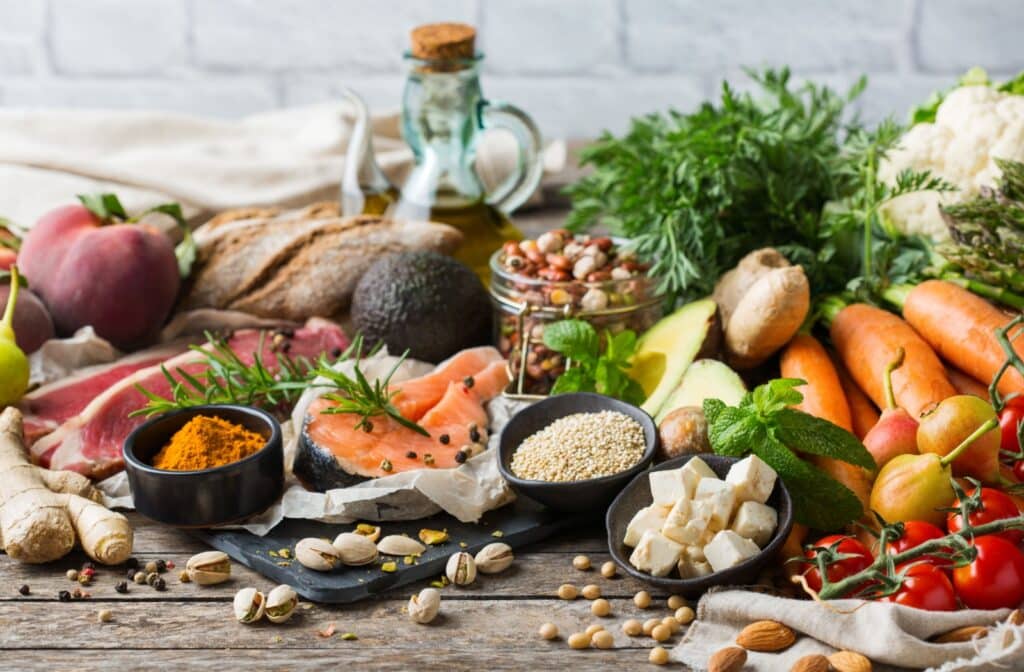Aging naturally brings about changes to our body, including our heart. Our risk of developing heart conditions increases as we grow older. Consuming a balanced diet of whole foods is one of the many ways we can maintain and improve heart health.
A diet rich in whole foods helps to reduce inflammation, high blood pressure, and bad cholesterol which supports maintaining optimal heart function. These include:
- Fruits and vegetables
- Whole grains
- Lean proteins
- Nuts and seeds
- Healthy fats
Importance of Maintaining Heart Health
Heart health is important for everyone, especially for adults 65 and over as the risk of developing cardiovascular diseases increases with age. Poor heart health can lead to an increased risk of experiencing heart attacks, strokes, or chronic heart disease, which can severely impact everyday living and quality of life.
Risk factors for developing heart disease can include:
- High blood pressure
- High cholesterol
- Lack of physical activity
- Poor diet
- Medical conditions like diabetes and obesity
Age is a risk factor for developing heart disease. As we age, our arteries naturally harden and narrow, and the heart works harder to pump blood. This can result in higher blood pressure and increased strain on the cardiovascular system.
Heart Healthy Foods for Seniors
Eating a balanced diet of whole foods is a powerful way to protect your heart. The following food groups and specific foods are great choices for maintaining and improving cardiovascular health as we grow older.
A balanced diet is the best way to obtain essential nutrients and minerals from food, but supplements can help fill any gaps in our diet. It’s best to prioritize whole foods over supplements whenever possible. Nutrients in whole foods are easier for the body to absorb and utilize effectively than supplements.
Fruits & Vegetables
Fruits and vegetables are packed with essential vitamins, minerals, and antioxidants that support heart health. Foods rich in antioxidants support heart health by reducing inflammation and improving overall cardiovascular function.
Fruits and vegetables are low in calories and high in fiber, which helps reduce cholesterol levels and improve digestion. Some examples of heart-healthy fruits and vegetables include:
- Berries: Berries like strawberries, blueberries, and raspberries are rich in antioxidants, which help reduce inflammation and lower blood pressure.
- Leafy Greens: Greens like spinach, kale, and Swiss chard are high in vitamins A, C, and K, as well as fiber and folate, which promote healthy blood vessels and reduce blood pressure.
- Citrus Fruits: Fruits like lemons, oranges, and grapefruits are excellent sources of vitamin C and potassium, which help manage blood pressure and overall heart function.
Whole Grains
Whole grains are an excellent source of fiber, which can lower “bad cholesterol” (LDL) and improve digestive health. They also provide essential nutrients such as B vitamins, iron, and magnesium. Some top choices include:
- Oats: These contain beta-glucan, a type of soluble fiber that helps reduce cholesterol levels.
- Quinoa: This is a high-protein grain that includes all nine essential amino acids, making it a great plant-based protein source.
- Brown Rice: This offers more fiber and nutrients than white rice, helping to stabilize blood sugar levels and support heart health.
Lean Proteins
Consuming lean proteins is important for maintaining muscle mass and overall health. These proteins are lower in saturated fats. Saturated fats can elevate “bad cholesterol” (LDL) which can harm heart health.
It’s important to focus on choosing whole, lean protein sources. Eating processed meats is harmful to heart health as they can be high in sodium and saturated fats.
Sources of whole lean protein include:
- Fish: Salmon, mackerel, and sardines are rich in omega-3 fatty acids, which reduce inflammation and lower the risk of heart disease.
- Poultry: Meats like chicken and turkey are great sources of protein without the high levels of saturated fat found in red meat.
- Legumes: Plant-based options like beans, lentils, and chickpeas provide protein and fiber, helping to lower cholesterol and improve heart health.

Nuts & Seeds
Nuts and seeds are packed with healthy fats, protein, and fiber. They also contain essential vitamins and minerals such as vitamin E, magnesium, and potassium.
Some great options include:
- Almonds: These are high in monounsaturated fats and vitamin E, which help lower bad cholesterol and protect against artery damage.
- Chia Seeds: These are rich in omega-3 fatty acids, fiber, and protein, which support heart health and overall well-being.
- Flaxseed: These are small oil seeds that contain lignans, which have antioxidant properties and support cardiovascular health.
Healthy Fats
Not all fats are bad. Healthy fats, such as those found in avocados, olive oil, and fatty fish, are important for heart health. These fats help reduce bad cholesterol levels and increase good cholesterol.
Great sources of healthy fats include:
- Avocados: These are high in monounsaturated fats, which help lower bad cholesterol and maintain heart health.
- Olive Oil: Rich in antioxidants and monounsaturated fats, olive oil promotes healthy cholesterol levels and reduces inflammation.
- Fatty Fish: Fish like salmon and mackerel are excellent sources of omega-3 fatty acids, which support heart health and reduce the risk of heart disease.
Additional Ways to Improve Heart Health
A holistic approach to maintaining a healthy heart includes engaging in regular physical activity, stress management, and prioritizing sleep.
Physical Activity
Regular physical activity is important for maintaining a healthy heart. It helps to reduce blood pressure, manage weight, and improve cardiovascular health.
Older adults are encouraged to have at least 150 minutes of moderately-intense physical activity a week, such as walking swimming, or engaging in 75 minutes of vigorous physical activity weekly.
Stress Management
Chronic stress can negatively impact heart health. To help avoid the adverse effects of chronic stress, it’s recommended to have management strategies.
Practicing mindfulness through meditation or yoga, engaging in hobbies, and spending quality time with your social circle can provide a positive environment, reduce stress levels, and support heart health.
Importance of Sleep
Quality sleep is important for healthy hearts. Adults should aim for 7 to 9 hours of sleep per night to support their overall well-being.
Poor sleep can lead to high blood pressure, obesity, and other risk factors for heart disease. Establish a regular sleep routine, create a comfortable environment, and avoid caffeine and screen use before bed.
Connect with a Vibrant Community
Maintaining a healthy heart goes a long way in maintaining and improving quality of life as we grow older.
Community living can provide an environment that encourages healthy aging. Connect with our team at The Legacy at Santa Fe to schedule a tour and learn about the benefits of senior living.
